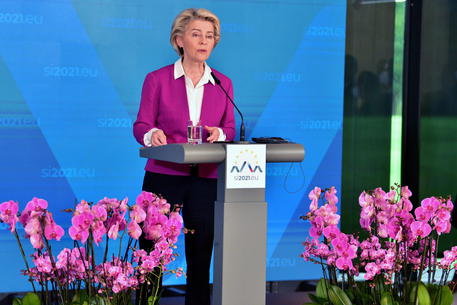(ANSA) - ROME, OCT 17 - In a report published in Brussels on
October 12, the European Commission recommended that EU
candidate status should be awarded to Bosnia and Herzegovina
(BiH), subject to reforms and conditions.
In his announcement statement, EU Enlargement Commissioner
Oliver Várhely urged leaders in Bosnia "to make the most of this
historic opportunity" and advance reforms.
The so-called Enlargement Package for 2022 includes the European
Commission's annual reports for the Western Balkans and Turkey.
Bosnia and Herzegovina received the status of a potential
candidate in 2003 and its application for membership in the EU
was officially submitted in 2016.
The next step on the path to membership will now be the opening
of formal accession talks, a step which again requires the
approval of all EU member states and may take years. The
commission's conditional backing for Bosnia follows a similar
approval for Ukraine and Moldova in June. Austria and Slovenia,
among others, had urged the bloc to also consider Bosnia during
the deliberations.
BOSNIA AND HERZEGOVINA: INTERETHNIC TENSIONS AFTER RECENT
ELECTIONS
On October 2, general elections were held in BiH, and although
the political winners have different views on most strategic
issues regarding the future of the country, one of the rare
issues where there is a formal consensus is joining the EU.
After the elections, the winners called for pro-European
reforms. The EU Commission's decision could give a new impetus
to the authorities in Bosnia and Herzegovina, which are to be
formed after the recent elections.
BiH officials reckon that the decision of the EU Commission to
recommend to the Council of the European Union the granting of
candidate status for EU membership to Bosnia and Herzegovina
comes at the right moment and is historic for the country and
its citizens. BiH Foreign Minister Bisera Turković welcomed the
Commission's recommendation, saying on Facebook: "This is a
strong message (…) that we hoped (for) earlier." She added that
it was a recognition of all the efforts BiH has undertaken,
despite obstacles, to align its policy with the EU, notably on
the Ukraine war.
The president of the Croat HDZ party in BiH, Dragan Čović, said
on Twitter this was "a historic day for BiH". Čović submitted
BiH's application for EU candidate status in 2016 in his then
capacity as Chair of the BiH Presidency.
Željko Komšić, one of the three members of the presidency, said
it was important for the commission to note that Bosnia and
Herzegovina had aligned 80 percent of its foreign policy
statements with the EU. He added, however, that the granting of
candidate status remained uncertain.
Regarding the electoral reform, he criticized the recent
decision of the High Representative of the International
Community in BiH, Christian Schmidt, who had made use of his
powers and imposed electoral law changes on election night on
October 2. Ahead of the elections, negotiations between key
political actors on electoral reform had failed, heightening
political and interethnic tensions. The reform is mainly about
the problem of proportional representation of Croats as the
smallest of the three constituent peoples. Komšić has reported
Schmidt to the Constitutional Court, claiming that the electoral
law changes have deceived voters and further fueled ethnic
divisions. "The High Representative for BiH, in making
decisions, is completely disregarding rulings of the European
Court of Human Rights and the opinion of the European
Commission, and thus jeopardizes BiH's EU path," he said. On
Wednesday, EU Enlargement Commissioner Várhely appealed to the
leaders of BiH to "proceed quickly to reform the constitution
and the electoral law".
NEEDED REFORMS AND CONDITIONS
After the elections, the EU Commission called for a rapid
formation of government and authorities at all levels, so that
they could tackle the fulfillment of the conditions. The
required reforms to advance entry into the bloc relate to
building the rule of law, adopting measures to prevent conflicts
of interest, and strengthening the prevention of and fight
against corruption and organized crime. In addition, Bosnia and
Herzegovina must promote measures to ensure effective
coordination at all levels of border management and immigration,
as well as the functioning of the asylum system. The conditions
also include ensuring the prohibition of torture, freedom of
expression and the media, and the protection of journalists.
However, due to internal political divisions, the question is to
what degree BiH will be able to fulfill the set conditions.
"Today's choice is a political impulse. Certainly, Bosnia does
not meet all conditions to be a country of the EU today.
However, we believe that these conditions will become reality.
It is an impulse, which I hope the new political authorities of
Bosnia will understand and exploit. It is an incentive for
action",
said EU High Representative for Foreign Affairs Josep Borrell.
He also stressed that the recommendation comes at a time when "a
battle of ideas is underway with Moscow. We cannot close our
eyes to its growing influence, not only in the Balkans".
This article was produced with contributions from ANSA, dpa,
FENA, HINA, MIA and STA as part of the European Newsroom
project. (ANSA).
Bosnia and Herzegovina takes next step toward EU membership
Commission recommends granting EU candidate status
